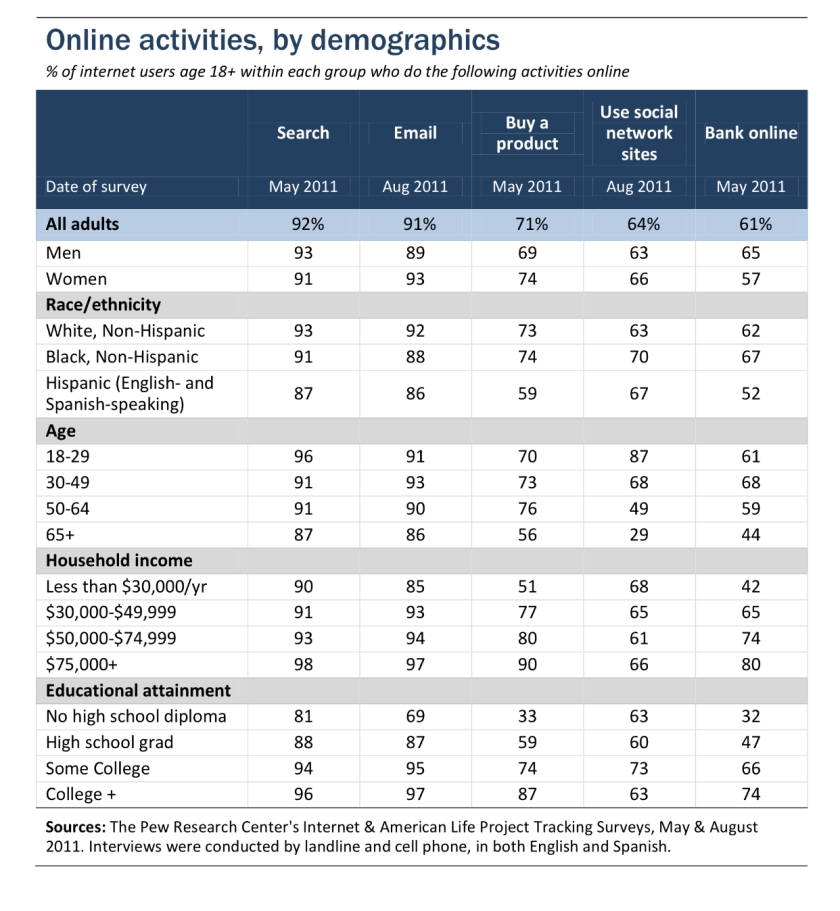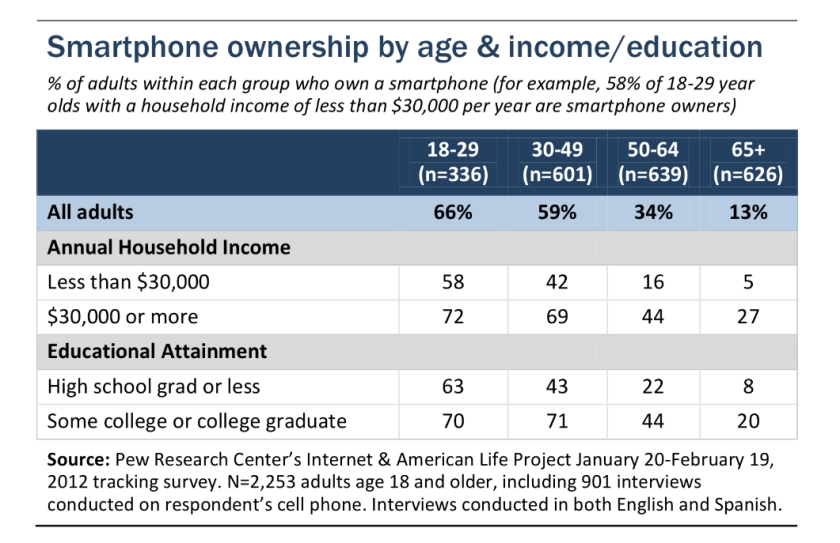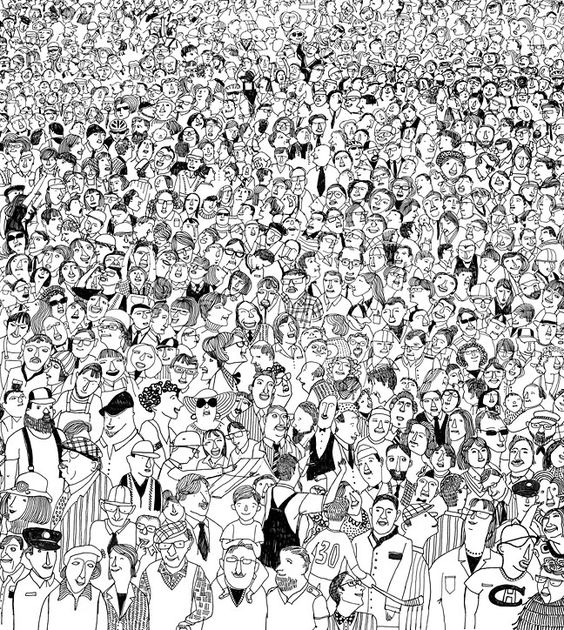With the dependence of technology in modern society. There’s a great increase in online users. With a huge population on the web, different segmentation of audience create digital differences.
In the modern society, we are empowered with unbeatable inter-connectivity through the web and daily functions could be accomplished at the ease of our fingertips. The figure below segments the different type of demographics and activities performed by them respectively. To cite one polar opposite differences would be users aged 18-29 and 65+ using social networking sites, 87% to 29% respectively.

With the continuous increase in capability of smartphones, working on the web becomes an even more effortless tasks. Smartphone has now integrated to human’s day to day necessities and with such functionality provided by smartphones, it’s a surprise that there are still people living without the use of technology.
Ownership and usage of smartphones could be related to income/education level. Below table proves that there’s a correlation between income/education and ownership of smartphones.

Understanding the extensive difference in web population will prove beneficial to the targeted market, understanding the behavior of users in different demographic.
Digital differences in personal context.
As a Generation Y, growing up in a modern, fast-moving country. We reap the benefit of harnessing the power of technology. We are taught and exposed to technology at tender age. Digital differences in Singapore is relatively smaller, with little gap in demographic differences. Researching into this topic opened my view on the issue of digital differences in beyond my familiar setting in a local context.
Conclusion
As I’m writing this blog post, I’m doing it on the move with my mobile phone. Power of technology and smartphones created endless possibility and options of working. Digital difference is surely a big topic to understand, it will enhance our knowledge and approach to view the online population.
Citation:
Click to access PIP_Digital_differences_041312.pdf
Word Count: 306


Great job on providing supportive evidence correlating towards income and education level when it comes to online activities. I would like to expand on the minority groups and their digital habits.
In a recent study, the less educated are increasingly getting their news on social media, with 74% non-whites (all ethnic groups, except non-Hispanic white) get their news on social media more than whites (64%). Social media news use has also “increased by 69% in 2017, among those with less than a bachelor’s degree and surpassing those with a college degree or higher (63%)” (Bialik & Matsa, 2017).
On a personal level, I question the credibility of information they receive on these platforms. Shouldn’t we educate these groups on how to access reputable news organization to prevent falsification of important issues? The old and less educated might be susceptible and swayed by biased opinions (e.g. Political views). The information received should be factual with no ulterior motive.
(Word Count: 154 Words)
Reference:
Bialik & Matsa, 2017. Key trends in social and digital news media (online). Retrieved from: http://www.pewresearch.org/fact-tank/2017/10/04/key-trends-in-social-and-digital-news-media/
LikeLiked by 1 person
Hey Marianne!
Thanks for your comment. I share a similar sentiments with you towards credibility of information provide through the web. As we become more interconnected and with information from the web just fingertips away, we will surely come across ridicule news/stories on our personal experience. As human becomes more digitally-educated, content creation on the internet becomes more of an ease, this empowers any individuals the ability to share and curate their very own message. Worse of all, in a liberal society it is almost impossible to govern and take action round the clock for users that carry out inappropriate actions on the web.
With above said, I agree that education has to come in place to inform individuals on the repercussion of buying into falsified news and methods to differentiate truth and false reports. This has to be done especially to groups that are more vulnerable to falling for bogus sources online. In my personal viewpoint, i trust that issue of falling for fake news will decrease with growing internet literacy and proficiency in our population.
Below link is a journal with regards to fake news and it might be an interesting read for you on this topic. https://web.stanford.edu/~gentzkow/research/fakenews.pdf
Have a great day! Hope my opinion further your thoughts on this issue.
LikeLiked by 1 person
That’s interesting to note Gary and I agree with your sentiments, digital empowerment on the Web creates a safe place for learning and growth takes place!
The journal is very insightful in understanding the growth of internet literacy and proficiency in our population, perhaps Singapore can learn a thing or two about how to handle fake-news internally.
LikeLike